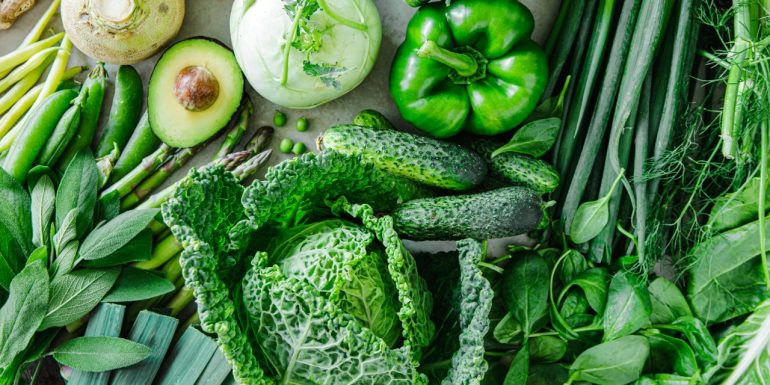
Alkaline diet: definition & tips
How healthy are alkaline diets and when does an alkaline diet make sense? Are alkaline diets anti-inflammatory? Find out more about alkaline diets and their potential advantages and disadvantages.
What is an alkaline diet?
People who follow an alkaline diet generally eat 70 to 80% alkaline food. These are foods that the body metabolises into alkali, which is important for keeping its acid-alkali balance in equilibrium. Alkaline diets are based on alkaline foods and feature minimal acidifying foods. However, following an alkaline diet does not mean completely renouncing acidic foods: roughly 20 to 30% of the alkaline diet consists of what are referred to as good acidifiers. Many people who eat an alkaline diet seek to counter hyperacidity, but there are many other reasons why you might, under certain circumstances, opt for an alkaline diet.
Good to know: the alkaline diet we describe here is suitable as a practical long-term diet for healthy people. Experts also refer to it as a “deacidified diet”, thus differentiating it from an exclusively alkaline diet – this being a term used to refer to a treatment that takes anywhere between three weeks to a maximum of three months and is comprised solely of alkaline food.
Alkaline diet: benefits
An alkaline diet can help with a range of complaints and issues:
- Alkaline diet for weight loss: if you want to lose weight, you may under certain circumstances benefit from an alkaline diet. Alkaline foods such as oranges and carrots contain fewer calories than non-alkaline foods such as meat or dairy products. This makes it easier to take on board fewer calories than the body needs (calorie deficit). The alkaline diet also helps to build muscle: it is rich in magnesium, potassium and calcium – minerals that are important for bones and muscles.
- Alkaline diet for reflux: in gastroesophageal reflux disease, stomach acid rises up the oesophagus and causes discomfort. Some people find that alkaline food provides relief from this. Suitable foods include green vegetables, potatoes and wholemeal pasta. An alkaline diet also frequently reduces the symptoms of heartburn.
- Alkaline diet for osteoarthritis: An alkaline diet can also have a positive effect on phosphate metabolism under some circumstances. This in turn has an impact on the bones and connective tissue, which means that an alkaline diet can help with osteoarthritis (joint wear) and osteoporosis (bone loss).
- Alkaline diet for inflammation: alkaline foods often contain a lot of antioxidants. These have an anti-inflammatory effect.
- Alkaline diet for lipoedema: in some cases, an alkaline diet can have a favourable effect on lipoedema. Those affected should ideally opt for foods such as cucumber or papaya.
- Alkaline diet for acne: acne often has hormonal causes, but in many cases, diet can affect the complexion as well. Alkaline diets contain lots of fruit and vegetables. These foods may have an alleviating effect on acne.
Alkaline diet: disadvantages
Occasionally, alkaline diets face criticism from experts. That’s because alkaline diets are rooted in complementary medicine. This assumes that acidic foods disrupt the acid-base balance of the body, leading to hyperacidity and ultimately resulting in complaints such as allergies and gout. However, there is no scientific evidence for this. Healthy people who eat a balanced diet generally have no reason to fear hyperacidity.
The alkaline diet does, however, include a lot of foods with important nutrients. These promote well-being. However, you should opt for a varied diet, rather than eating solely alkaline foods. Switching to a purely alkaline diet may potentially result in nutrient deficiencies and deficiency symptoms such as hair loss.
NB: you’ll find many myths relating to nutrition for serious illnesses online. Incorrect or one-sided approaches to nutrition may be harmful to your body. So be careful with specific diet recommendations, such as the alkaline diet for cancer. There is no scientific evidence of the effectiveness of so-called “cancer diets”. Talk to a doctor instead. They will help you to find the right diet for your needs.
Alkaline diet: which foods are suitable?
An alkaline diet consists of 70 to 80% alkaline foods. This table shows alkaline foods that could be eaten for breakfast, lunch and dinner. Add 20 to 30% good acidifiers such as oats, pulses, wholegrain foods, rice, corn or potatoes to meals. Organically farmed animal products and tofu and tempeh are also suitable additions to an alkaline diet.
|
|
|
|---|---|
|
|
|
|
|
|
|
|
|
Meal
Foods
Breakfast
- Juice from apples, pineapples and carrots
- Smoothie made from fruits and leafy vegetables
- Tropical salad of bananas, pineapple and mango with homemade strawberry sauce
- Vegetable sticks with avocado cream
Lunch
- Large salad with pine nuts
- Green bean soup
- Couscous with steamed vegetables
Dinner
- Vegetable soup made from fresh tomatoes or potatoes
- Sweet potatoes with peppers and flaked almonds
- Konjac noodles with tomato sauce
Please note: this table is not exhaustive. Thanks to the large range of alkaline foods, the possibilities are endless when it comes to putting together an alkaline diet.
There are no specific alkaline diet recommendations for children and adolescents. So avoid splitting foods up into the categories “healthy” and “unhealthy”. A varied and balanced diet is far more important. Ideally, refer to the information provided by the Swiss Society for Nutrition: offer your child colourful fruit and vegetables with all main meals and snacks. Adequate water or tea will cover their fluid requirements and serve as a good alternative to sweetened drinks.
Alkaline diet – what should I avoid?
Avoid bad acidifiers if you want to eat an alkaline diet. These are foods that have an acidifying effect and only contain minimal essential nutrients. These include, for example:
- Sweetened drinks like cola
- Alcohol
- Products made from white flour
- Sweets
- Highly processed foods such as sausage products and ready meals
- Animal products from traditional livestock farming (e.g. factory farming)
NB: in some lists, eggs, fish and all types of meat are classed as bad acidifiers too. Ideally, you should ask your doctor whether or not it makes sense for you to completely forgo these. After all, eggs and meat are rich in protein and B vitamins, among other things. As well as minerals, some fish species like salmon also contain protein and omega-3 fatty acids.
Alkaline diet: tips for beginners
You don’t need to make any radical changes to start an alkaline diet. Just follow these simple tips:
- Swap sweetened drinks for still water. Add berries, fruit or fresh herbs such as mint or rosemary to these if need be. Herbal tea or alkaline tea blends are also suitable.
- Set aside enough time for your meals and enjoy every bite.
- Use fresh ingredients and avoid ready-made products.
- Incorporate lots of fresh fruit and vegetables into your meals.
- Find out what kind of diet suits you: some people like to split their meals up into small portions and eat these throughout the day. Others prefer three meals a day and others take extended breaks between meals (intermittent fasting). Schedule your meals in the way that best suits you.
- Drink enough fluid, i.e. 2.5 litres of water per day.
An alkaline diet offers endless ways of adding variety to your meals. It contains fresh fruit and vegetables, thus contributing to your well-being – but be careful not to rely solely on alkaline food. It is more important to maintain a balanced diet that contains lots of different nutrients. In the event of any uncertainty, consult a specialist such as a doctor or a nutritionist.

The expert provided the editorial team with advice and input for this article. Nadia Cifarelli (BSc Psychology, certified holistic health advisor) works for the Helsana health consultation service. She helps customers on issues to do with prevention, nutrition and mental health.


Newsletter
Find out more about current health issues every month and get all the information you need about our attractive offers from all Helsana Group companies * delivered by e-mail to read whenever it suits you. Our newsletter is free of charge and you can sign up here:
We did not receive your information. Please try again later.
* The Helsana Group comprises Helsana Insurance Company Ltd, Helsana Supplementary Insurances Ltd and Helsana Accidents Ltd.